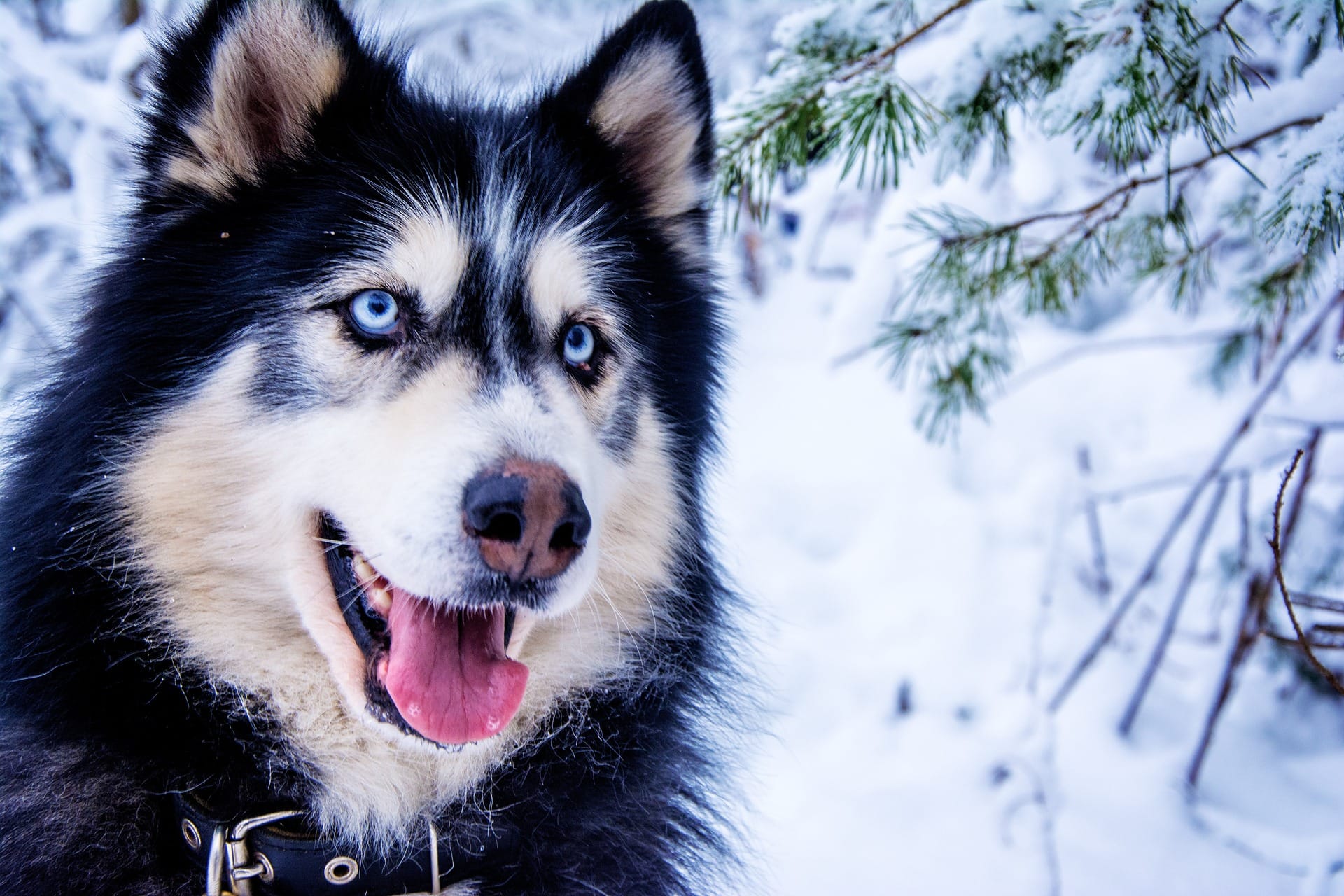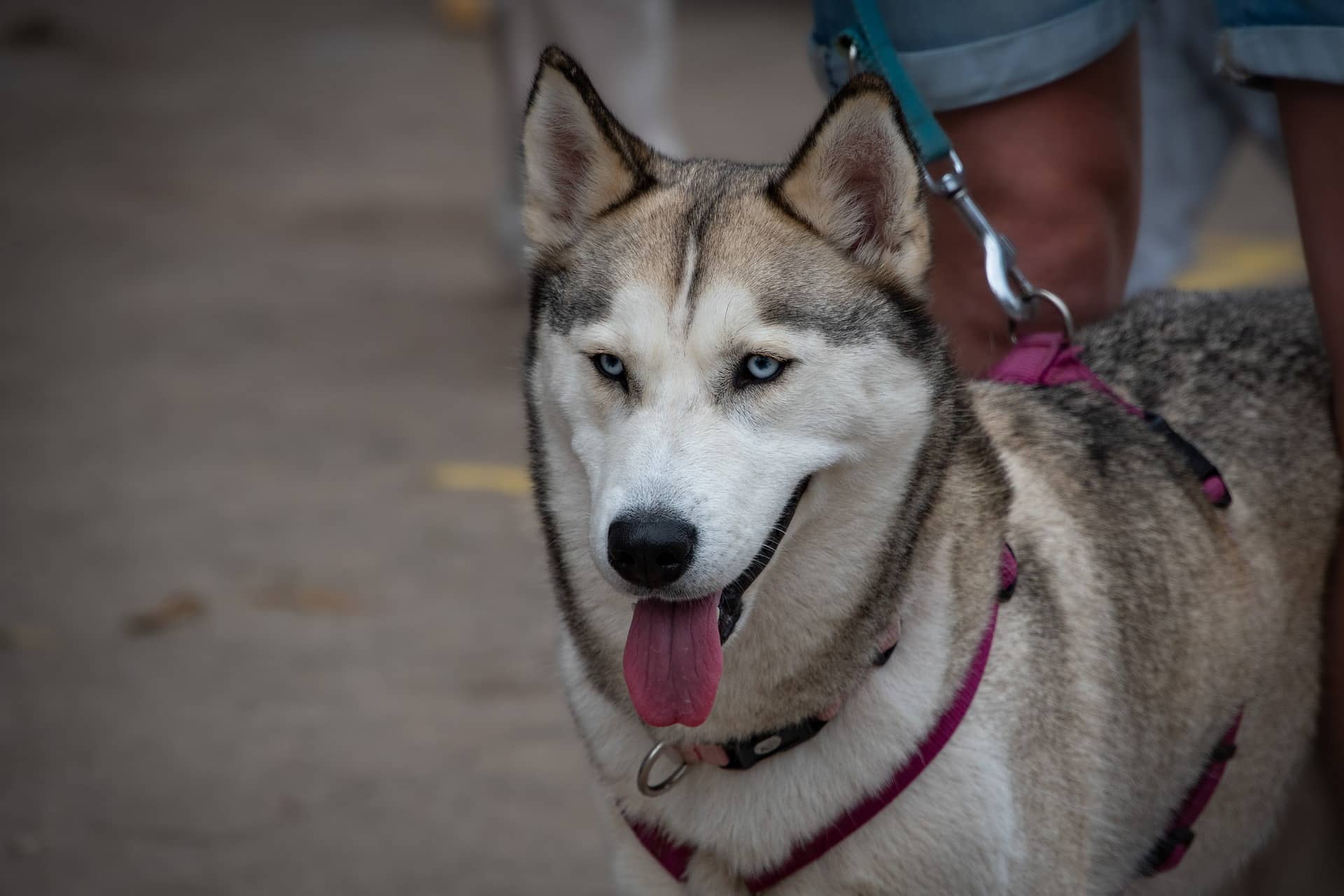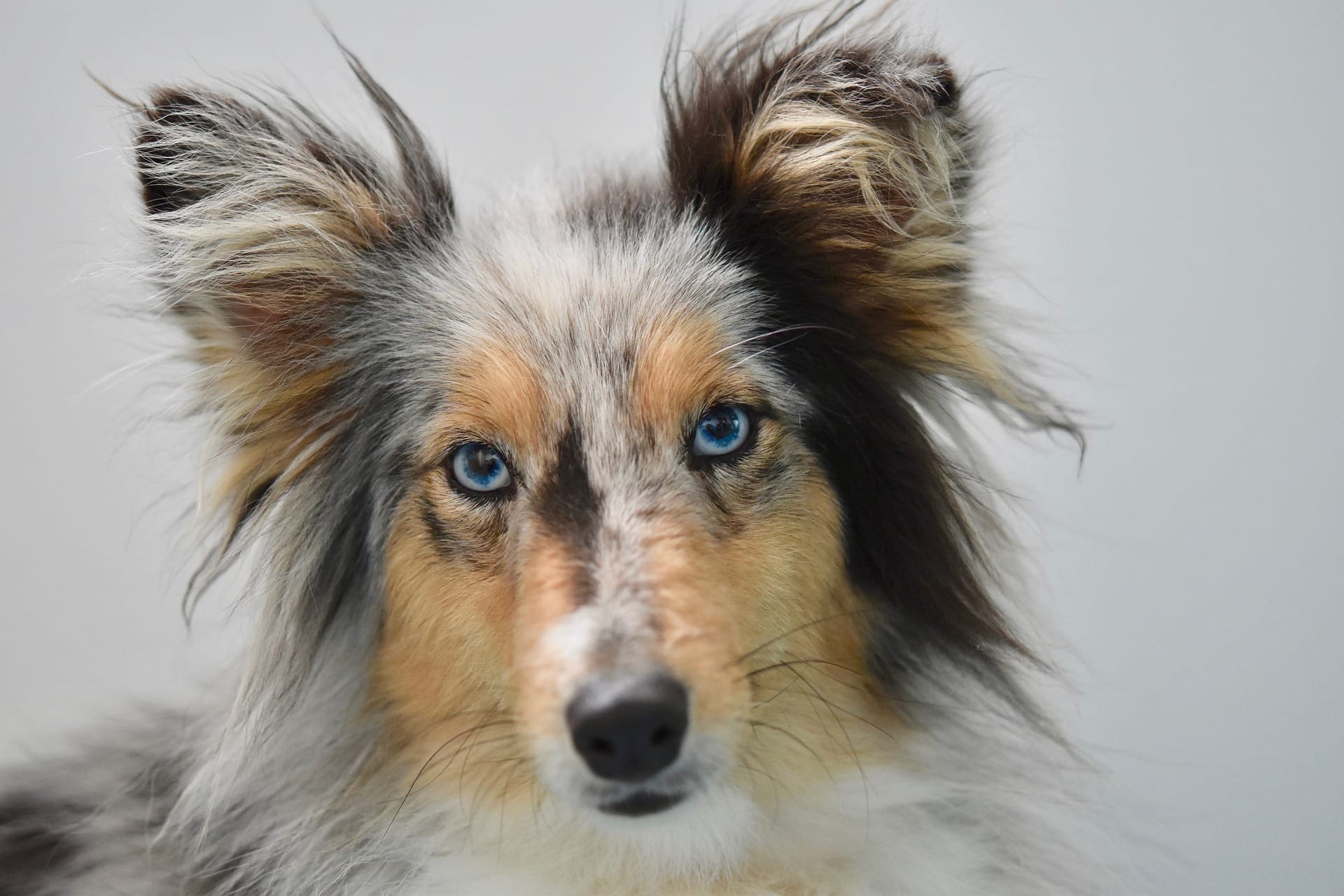
The piercing gaze of a dog with blue eyes can be captivating. The color of these eyes symbolizes the need for extra attention and love to ensure their safety and health. They almost ask you to care for and protect them from harm.
You can’t help but feel a connection when looking into those remarkable eyes, so it’s essential to understand what having a blue-eyed dog means for you. In this article, we’ll cover the breeds that can have blue eyes, potential health risks associated with this eye color, signs of glaucoma or cataracts, regular checkups and care needed for dogs with blue eyes, as well as nutrition tips specifically designed for these furry friends.
Knowing all this information will allow you to provide the best possible care for your pup.
Breeds that Can Have Blue Eyes
Certain breeds of puppies can have stunning blue peepers. So, if you’re looking for a pup with this unique trait, check out these breeds!
Siberian huskies, Alaskan Malamutes, Great Danes, and Australian Shepherds are all breeds that can have beautiful blue eyes. Eye coloration is most commonly inherited as a genetic trait from their parents or ancestors; however, in some cases, it may result from other factors.
Each canine companion has unique personalities and characteristics, from the majestic Great Dane to the energetic Australian Shepherd. While blue eyes certainly make them stand out in a crowd, they also come with many other features that will surely win your heart.

Siberian Huskies are known for being loyal and affectionate, while Alaskan Malamutes are usually independent yet still social dogs that thrive on human interaction. No matter which dog breed you choose to bring into your life, learning about its traits and needs before committing can help ensure you get off the right paw!
When it comes to eye coloration, understanding what causes it and how to care for those delicate eyes will give you peace of mind when selecting your four-legged friend.
Possible Health Risks
Although rare, potential health risks could be associated with having a pup with blue eyes, so it’s essential to watch for any symptoms.
Before getting a dog with blue eyes, it’s essential to have them undergo genetic testing to ensure they’re healthy and free from any diseases that may cause problems in the future. As part of your due diligence, you should also ensure that your pup has adequate sun protection, as exposure to too much UV light can harm their eyes and lead to vision loss.

Another thing to look out for is skin cancer in dogs with blue eyes. They tend to be more prone than other breeds because they lack pigment around their eyes, which helps protect against UV rays. You must check your pup’s ears regularly for signs of discoloration or lesions, which could indicate skin cancer.
Additionally, it’s a good idea to take them for regular vet checkups where the vet can look at their coat and check for any suspicious spots or changes in size or shape of moles or freckles on the skin.
It’s always good practice when caring for a pet – no matter what breed – to pay attention and note any changes in behavior or appearance that may indicate an underlying issue. In particular, watch out for
excessive squinting, redness, or swelling around the eyes, signaling inflammation or infection. If you notice these kinds of symptoms, then don’t hesitate – contact your vet right away!
Signs of Glaucoma and Cataracts
It’s essential to be aware of the signs of glaucoma and cataracts, which can affect up to 60% of all pets, so you must look out for any changes in your pup’s vision. Early detection is critical when it comes to managing these diseases, and eye drops may also help treat them.
Here are some common signs that your pup may have either glaucoma or cataracts:
- Cloudy eyes: Glaucoma is marked by gray eyes, while cataracts will cause a white film or membrane to form over the eye.
- Redness: Both glaucoma and cataracts may cause redness in the whites of your pup’s eyes since they are both caused by inflammation.
- Apparent blindness: If your pup seems unable to see things that used to be familiar, this could be a sign of severe ocular diseases like glaucoma or cataracts.

When you notice any changes in your pet’s vision, take them in for an appointment right away because early detection is essential for managing these conditions appropriately.
An experienced vet can provide treatment options such as antibiotics and eye drops that can help restore healthy vision if caught soon enough.
Regular Check-Ups and Care
Regular check-ups and care are essential for keeping your pup’s eyes healthy, so make sure to take them in for regular appointments with the vet! Your vet can check for signs of glaucoma and cataracts, as well as any other eye problems that may be present. They will also be able to provide tips on proper eye protection and genetic testing.
Your dog should have their eyes checked every six months or more often if they’re showing signs of discomfort or vision loss. During the exam, the vet will look closely at your pup’s eyes and check for any signs of swelling or redness. They’ll also check the pressure inside the eye to determine if there is a risk of glaucoma. In addition, they’ll examine how well your pup can see by having them look at objects from different distances and angles.
| It’s important to practice preventative measures when it comes to caring for your dog’s eyes. This includes providing adequate nutrition, avoiding irritants like smoke and dust, and protecting their eyes from bright lights or foreign objects such as sticks or dirt that could cause an infection. Additionally, using products specifically designed for dogs’ eyes such as goggles during outdoor activities can help protect them from potential harm. | Task | How-to Guide |
|---|---|---|
| Check Eyes Regularly | Every 6 Months + More Frequently If Signs Of Discomfort/Vision Loss Present | |
| Look For Signs Of Swelling/Redness | Closely Examine Eye Area & Pressure Inside The Eye To Determine Glaucoma Risk | |
| Practice Preventative Measures When Caring For Dog’s Eyes | Provide Adequate Nutrition & Avoid Irritants; Use Products Specifically Designed For Dogs’ Eyes (Goggles Etc) During Outdoor Activities To Protect From Potential Harm |
By taking these steps you can ensure that your dog enjoys good vision health throughout its lifetime!
Nutrition for Dogs With Blue Eyes
Dogs with blue eyes have unique dietary requirements that support eye protection and overall well-being. No matter the hue of your pup’s peepers, nutrition is vital for optimal ocular health; nourish their vision with the proper regimen. Consider adjusting their diet as needed to ensure your pet stays healthy and sighted.
If you’re unsure what to feed a dog with blue eyes, it’s best to consult a veterinarian. Your pup’s nutritional needs may change depending on age, activity level, and underlying medical conditions.
Generally speaking, dogs require high-quality proteins from sources like meat, poultry, and fish in combination with complex carbohydrates such as whole grains, fruits, and vegetables. It’s also important to provide your pup with essential fatty acids found in foods like olive oil and salmon oil for healthy skin and coat and lower inflammation levels throughout the body.
When selecting food products for your four-legged friend, look for those specifically tailored to meet their individual needs – including those related to eye care – by checking labels for quality ingredients such as antioxidants which can aid in maintaining good vision over time.
And although treats are often used as rewards or unique gifts during training sessions or to celebrate holidays, choosing snacks made without added sugar or artificial colors can help keep your pup happy and healthy while protecting their precious peepers too!
Frequently Asked Questions
How can I tell if my dog has blue eyes?
Are you wondering if your pup has blue eyes?
While some dogs have naturally blue eyes, others may develop them due to genetic testing or eye diseases.
To find out, take your pup to the vet for a general checkup. The doctor can tell you if their eyes are blue and what might be causing it.
If the cause is genetic, you should consider testing your pup to determine its breed mix.
If the cause is an eye disease, the doctor will likely provide treatment options so your pup stays healthy and happy!
Are there any special grooming needs for dogs with blue eyes?
Do you worry about the grooming needs of your blue-eyed pup?
Eye protection is necessary for blue-eyed dogs, as they’re more prone to genetic health issues and eye infections. Taking extra precautionary steps in their grooming regimen can help protect them from long-term damage.
You can ensure they receive the necessary care for healthy vision through proper nutrition and regular vet visits.
Additionally, it’s important to practice preventive measures such as regularly cleaning their eyes and providing adequate shade outdoors.
With some extra effort, your four-legged friend can maintain optimal eye health.
Are there any special precautions I should take for my dog if it has blue eyes?
You should take special precautions for your dog if it has blue eyes.
Exercise requirements should be tailored to your pup’s needs, as overly strenuous exercise can strain their delicate vision.
Additionally, you should consider investing in protective eyewear for your pup when they’re outdoors – especially if the weather is windy or sunny.
This will help preserve their vision and keep them comfortable while enjoying the elements.
How often do I need to take my dog to the vet if it has blue eyes?
You have a beautiful four-legged companion with blue eyes and want to ensure they remain happy and healthy.
A good rule is to take them to the vet at least once a year. However, if your pup has blue eyes, some additional factors can determine how often they should visit the vet.
Genetic disorders can be more common in certain breeds with blue eyes, so you’ll need to watch for any signs or symptoms of illness that could indicate something more severe than simple allergies.
Additionally, since their eyes are sensitive to light, be sure to provide sufficient sun protection for your pup and regular vet visits.
Are there any special dietary needs for dogs with blue eyes?
If you own a dog with blue eyes, you may need to take special dietary precautions to ensure their eye health.
Dogs with blue eyes are at an increased risk of developing eye conditions due to sun exposure and lack of protection, so they must get the necessary nutrients to help protect their eyes.
Foods high in antioxidants, such as fruits and vegetables, can help shield your pup’s eyes from the sun’s harmful UV rays while providing essential vitamins and minerals for overall health.
Omega-3 fatty acids are also crucial for healthy vision, so include fish or other sources rich in this nutrient in your dog’s diet.
Taking these steps will help keep your beloved companion’s blue eyes sparkling!
Conclusion
You’ve learned a lot about owning a dog with blue eyes. While they’re stunningly beautiful, you need to be aware of some risks associated with their eye color.
Ensure your pup gets regular checkups and care, and provide them with good nutrition to help reduce the chances of developing health issues.
For example, if your pup is diagnosed with glaucoma or cataracts, you must treat them immediately.
Early detection can help prevent further vision loss and keep your furry friend healthy for years.
With proper care and attention, you can ensure your dog will have a long, happy life full of love!
“Make a life-changing difference today! Visit BoneVoyageDogRescue now and help us save furry friends in need. Volunteer, donate, or adopt your new best friend. Start your journey of compassion and love!”
